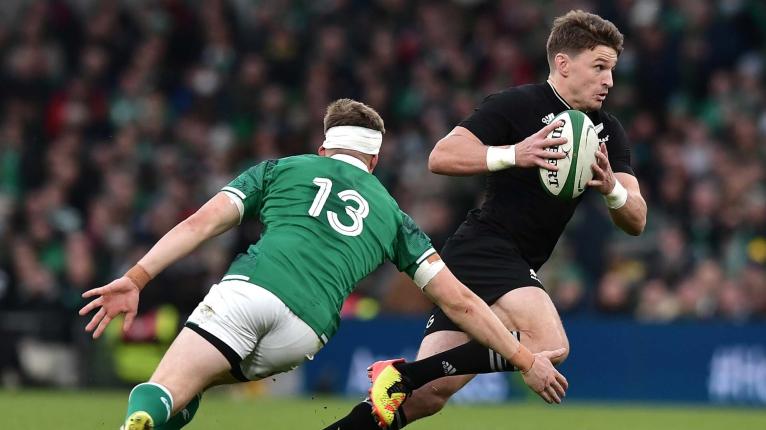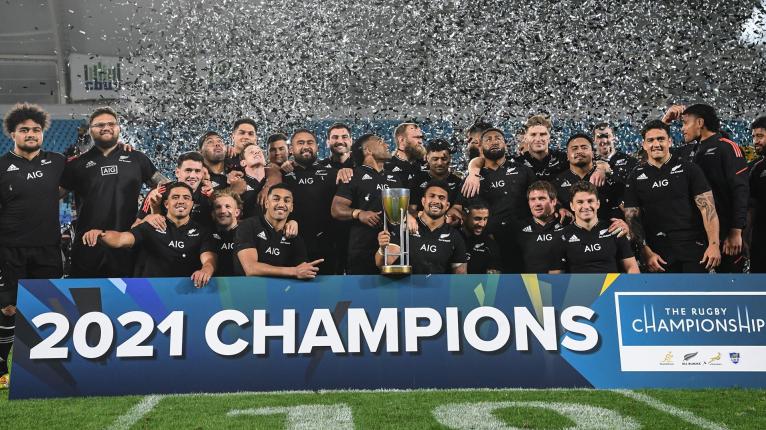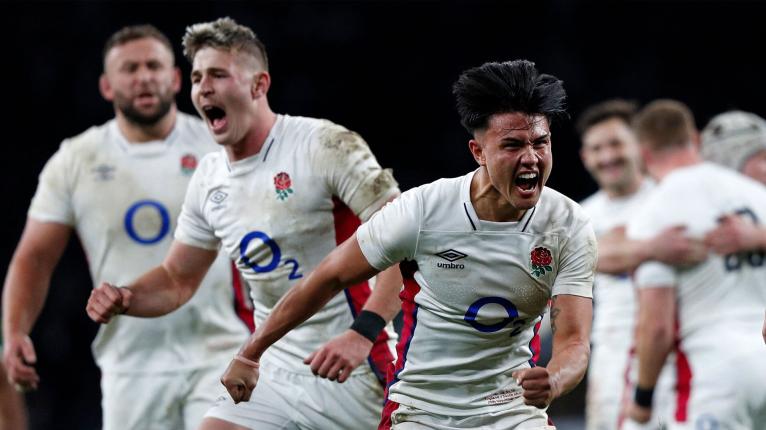Picking rugby's winners and losers of 2022 in eight bold predictions

The New Year is upon us, meaning a new year of rugby action from across the globe is set to get underway with added intrigue surrounding this year’s slew of matches given the World Cup is due to kick-off next year.
However, there is plenty of water to pass under the bridge of the rugby fraternity before then, so here’s a gaze into our crystal ball to make some predictions about how 2022 will pan out.
France will win the Six Nations

I’m not exactly going out on a limb with this one to start us off considering how well-documented France’s rugby renaissance has been since the 2019 World Cup.
In addition to their impressive performances in Europe in recent times, victory over the All Blacks in November has, in the eyes of many, cemented the status of Les Bleus as serious contenders to claim their first World Cup title in their own backyard.
So, to say France will win the Six Nations may not be the boldest of claims, but, for all the plaudits Fabien Galthie’s men have received, they are remarkably still yet to win any tournaments in this current World Cup cycle.
France’s second-place finish in the 2020 Six Nations was impressive given how mediocre they were for such a long time prior to that, and they followed that up with a strong showing in the Autumn Nations Cup.
However, the vastly inexperienced Frenchmen were denied the title in a dramatic extra-time defeat to England at Twickenham, and then failed to win the 2021 Six Nations title from pole position after falling short at the hands of Scotland at the final hurdle.
A second-string team then couldn’t quite get over the line against a full-strength Wallabies side in July, although their win over the All Blacks mean they have some silverware stowed away in the form of the Dave Gallagher Trophy.
That won’t have quenched France’s thirst for more success, though, and with a youthful playing contingent spearheaded by none other than Antoine Dupont, Les Bleus look primed to end their 12-year Six Nations title drought.
Blues will win Super Rugby Pacific

It will take a herculean effort to prevent the Crusaders from claiming yet another trophy with Scott Robertson at the helm and Richie Mo’unga running the cutter.
However, the Blues have the personnel to do just that. Take a scan across their playing roster and you’ll find the Auckland-based franchise are the only team in the competition to match the Crusaders for depth and quality across the board.
Their backline, for instance, could feature four All Blacks (Beauden Barrett, Rieko Ioane, Caleb Clarke and Finlay Christie), former NRL star Roger Tuivasa-Sheck and a slew of promising youngsters headlined by prodigious fullback Zarn Sullivan.
The forward pack, meanwhile, is comprised of a propping cohort of four All Blacks (Nepo Laulala, Ofa Tuungafasi, Karl Tu’inukuafe and Alex Hodgman) and a loose forward contingent of three All Blacks (Akira Ioane, Dalton Papalii and Hoskins Sotutu), as well as highly-touted rookie Anton Segner.
That’s not even taking into consideration occasional captain and fringe All Blacks prospect Tom Robinson, who may be forced into the second row alongside 2015 World Cup winner Luke Romano in the absence of Japan-bound Patrick Tuipulotu.
In essence, this Blues side oozes class, experience and potential, and it will be as interesting as it will be exciting to see if they can live up to expectation after their title-winning exploits in Super Rugby Trans-Tasman last year.
Australian and Pacific sides will struggle in Super Rugby Pacific

Across the other side of Auckland, Moana Pasifika are expected to struggle in their maiden Super Rugby Pacific season, and it’s easy to understand why when they’ve been tasked with taking on Kiwi teams in their first eight matches in existence.
Keep in mind that these are the Kiwi teams that limited their Australian counterparts to just two wins from 25 matches last year.
Expect to see more dominance from the eastern side of the Tasman this year, with the Reds and Brumbies to be the only Australian teams qualify for the play-offs in a flawed system where eight of the competition’s 12 teams make the knockout stages.
That play-off structure is designed to ensure at least one Australian team will make the post-season, but they will be doing well if any more than two of their teams progress past the round-robin.
In fact, it could be that Moana Pasifika – a team made up of ex-Wallabies, Pacific Island internationals and provincial players from New Zealand – and the Fijian Drua garner most of their first-year success from uninspiring Australian outfits.
Regardless, both of those expansion franchises, as well as the Waratahs, Western Force and Melbourne Rebels, will end up jostling for the eighth-place knockout berth, only to join the Reds and Brumbies in the scrapheap after the quarter-finals.
All Blacks, England, Springboks, Scotland and France will win July series

This year’s July test series pits the All Blacks against Ireland in what is arguably the headline act of that test window after the Irish beat the Kiwis in November.
Seeking revenge, Ian Foster’s men should emerge from the three-match series victorious, as they typically do against European opposition at that time of the year.
Don’t expect the visitors to lie down and roll over, though, as they could well pick up a win of their own and push the All Blacks close in the decider.
Elsewhere, England should prove to be too strong for the Wallabies in Australia, as should the Springboks for Wales in South Africa.
Scotland, meanwhile, will win at least two tests against a lowly Los Pumas outfit in their first matches in Argentina since 2019, while France will flex their muscles to sweep the Brave Blossoms in Japan.
All Blacks will retain Rugby Championship and Bledisloe Cup

It’s hard to see much changing from this year’s tournament, even if travel between New Zealand, Australia, South Africa and Argentina on a regular basis resumes for the first time since 2019.
The All Blacks will again finish top of the heap and condemn the Wallabies to two decades of Bledisloe Cup drought, with the Australians reliant on the services of Quade Cooper and Samu Kerevi to win that trophy back.
New Zealand won’t achieve that without defeat, though, as their long-awaited return to South Africa will see the Springboks pick up a victory over their old rivals.
That should be enough for the world champions to finish in second place, although a win and a loss against the Wallabies won’t be enough to lure the Mandela Challenge Plate back to the Republic.
Los Pumas, meanwhile, will continue to struggle following the dissolution of the Jaguares as their tired method of cobbling players together from around the world in a short timeframe will see them finish with the wooden spoon again.
England will go unbeaten in November

A lot could change between now and the Autumn Nations Series, with, at the time of writing, only England’s fixtures have been locked in.
However, as things currently stand, I’d back England to beat both the All Blacks and Springboks as well as Los Pumas and the Brave Blossoms in 10 months’ time.
Eddie Jones’ troops got the better of South Africa in a titanic tussle during the most recent November series, but the competitive nature of that match shows how things could go either way in London later this year.
The Springboks will make it tougher for England than the All Blacks will, though, but both matches will end with winning margins of seven points or less.
The preceding matches against Argentina and Japan will be more of a formality for the English as they continue to build toards France 2023.
Samoa or Tonga will secure an upset win in July or November

The big story towards the end of last year was World Rugby’s surprise change of its eligibility laws to allow test-capped players to play for a second country they are eligible for via birthright following a three-year stand down period.
In doing so, World Rugby has effectively opened the gate for Samoa and Tonga to access a raft of players who have played for the likes of the All Blacks and Wallabies, many of whom are available to play for those countries immediately.
That means we could see any one of Lima Sopoaga, Steven Luatua, Julian Savea, Ma’a Nonu, Charlie Faumuina, Victor Vito, Christian Lealiifano, Josh Ioane and Jeff Toomaga-Allen turn out for Samoa this year.
Likewise, Tonga could call upon Charles Piutau, Israel Folau, Malakai Fekitoa, Sekope Kepu, Vaea Fifita, Adam Coleman, George Moala, Augustine Pulu, Atu Moli and Sitaleki Timani at various stages throughout the course of the year.
Having access to such talent has the potential to turn both Samoa and Tonga from underachievers to world-beaters in an instant, and we may begin to see both teams reap the rewards of World Rugby’s rule change this year.
It’s yet to be seen what fixtures either country will play in the July and November test windows, and only time will tell if said players will be able to play for their second nations amid Covid uncertainty, but it would be tough to rule either team out of victory if they are at full-strength.
England will win the World Cup

The women’s edition of rugby’s global showpiece will finally take place in New Zealand this year after being delayed by 12 months.
Since the tournament was pushed back, England have emerged as easily the best team on the planet after they claimed yet another Women’s Six Nations title and dismantled the world champion Black Ferns with such conviction in November.
So good were the English that their head coach, Simon Middleton, became the first coach of a women’s side to win World Rugby Coach of the Year last month.
No team looks better placed to win the World Cup, which kicks-off in October, than the English, who could end up playing France in the final after they followed the lead of their northern rivals and thumped the Black Ferns in stunning fashion late last year.






































Comments on RugbyPass
The Springboks tried going down the road of only picking home-based players and it was an unmitigated disaster in 2016 and 2017. Picking overseas-based players has been one of the main reason the Boks have done so well since 2018, not only because of the quality Rassie could call on, but because of the knowledge and experience those players brought into camp from England, France and Japan. With some of the big names playing abroad it also gave younger players in SA the chance to break through at franchise level. Would we have seen the emergence of a Ruan Nortje if RG and Lood were still at the Bulls? Not so sure. I understand why Jake would want to block players leaving since his job depends on good results but it’s an approach that would take Bok rugby back to the bad old days and no South African wants to see that.
8 Go to commentsExeter were thumped by 38 points. And they only had to hop on a train.
34 Go to commentsI am De Groot.
1 Go to commentsHad hoped you might write an article on this game, Nick. It’s a good one. Things have not gone as smoothly for ROG since beating Leinster last year at the Aviva in the CC final. LAR had the Top 14 Final won till Raymond Rhule missed a simple tackle on the excellent Ntamack, and Toulouse reaped the rewards of just staying in the fight till the death. Then the disruption of the RWC this season. LAR have not handled that well, but they were not alone, and we saw Pau heading the Top 14 table at one stage early season. I would think one of the reasons for the poor showing would have to be that the younger players coming through, and the more mature amongst the group outside the top 25/30, are not as strong as would be hoped for. I note that Romain Sazy retired at the end of last season. He had been with LAR since 2010, and was thus one of their foundation players when they were promoted to Top 14. Records show he ended up with 336 games played with LAR. That is some experience, some rock in the team. He has been replaced for the most part by Ultan Dillane. At 30, Dillane is not young, but given the chances, he may be a fair enough replacement for Sazy. But that won’be for more than a few years. I honestly know little of the pathways into the LAR setup from within France. I did read somewhere a couple of years ago that on the way up to Top 14, the club very successfully picked up players from the academies of other French teams who were not offered places by those teams. These guys were often great signings…can’t find the article right now, so can’t name any….but the Tadgh Beirne type players. So all in all, it will be interesting to see where the replacements for all the older players come from. Only Lleyd’s and Rhule from SA currently, both backs. So maybe a few SA forwards ?? By contrast, Leinster have a pretty clear line of good players coming through in the majority of positions. Props maybe a weak spot ? And they are very fleet footed and shrewd in appointing very good coaches. Or maybe it is also true that very good coaches do very well in the Leinster setup. So, Nick, I would fully concurr that “On the evidence of Saturday’s semi-final between the two clubs, the rebuild in the Bay of Biscay is going to take longer than it is on the east coast of Ireland”
11 Go to commentsWhat was the excuse for the other knockout blowouts then? Does the result not prove the Saints were just so much better? Wise call to put your eggs in one basket when you’ve got 2 comps simultaneously finishing.
34 Go to commentsReally hope Kuruvoli and his partner rock the Canes.
1 Go to commentsI wonder what impact Samson has had on their attack, as the team seems less prone to trundle it up the middle, take the tackle and then trundle it up again. I lost faith in the coach last year as the Rebelss looked like a 2nd/3rd rate South African team. I also disliked Gordon standing back, often ignored as the forward battle went on and on. Maybe its our Aussie way of not getting off our A***’s until the enemy is at the gate.
86 Go to commentsThanks for the write up. Great to see the Rebs winning, I am a little interested in how they will go against the remaining kiwi teams, I think they’ve only played Hurricanes and Highlanders but how great to see these players performing!! I also see Parling has a job beyond June 30! A good move by RA? Also how do you fix the Rebels previously scratchy defence?
86 Go to commentsbe smart - go black
13 Go to commentsNext week the Crusaders hopefully have Scott Barrett back. Will be great to have the captain back. Hopefully he will be the All Black captain as well.
12 Go to commentsExciting place to be for the young fella. I expected he was French Polynesian when I saw him included in the France 6N squad (after seeing him in NZs), and therefor be strong grounds we might loose him to rugby down here. Good, in that he is good enough to warrant such a profile, and from a journalism’s fan interaction aspect, to finally get a back ground story on the fella. Hope he has settled into NZ OK and that at least one rugby country will fit with him to help his development, which, if so, he should surely continue for a few years, and then that he can experience France to it’s fullest with a bit more maturity and less reliance on family than you would have at his current age. A good 3 or 4 years before he would be ready for International duty if he wanted to wait. Of course he already sounds good enough to accept a call up, and to cap himself, in the more immediate future (he’d have to be very very good in the case of the ABs), and he’ll get a great taste of that being with the Canes who have a bunch who are just a few years further into their career and looking likely Internationals themselves.
13 Go to commentsI remember towards the end of the original broadcasting deal for Super rugby with Newscorp that there was talk about the competition expanding to improve negotiations for more money - more content, more cash. Professional rugby was still in its infancy then and I held an opposing view that if Super rugby was a truly valuable competition then it should attract more broadcasters to bid for the rights, thereby increasing the value without needing to add more teams and games. Unfortunately since the game turned professional, the tension between club, talent and country has only grown further. I would argue we’re already at a point in time where the present is the future. The only international competitions that matter are 6N, RC and RWC. The inter-hemisphere tours are only developmental for those competitions. The games that increasingly matter more to fans, sponsors and broadcasters are between the clubs. Particularly for European fans, there are multiple competitions to follow your teams fortunes every week. SA is not Europe but competes in a single continental competition, so the travel component will always be an impediment. It was worse in the bloated days of Super rugby when teams traversed between four continents - Africa, America, Asia and Australia. The percentage of players who represent their country is less than 5% of the professional player base, so the sense of sacrifice isn’t as strong a motivation for the rest who are more focused on playing professional rugby and earning as much from their body as they can. Rugby like cricket created the conundrum it’s constantly fighting a losing battle with.
8 Go to commentsOh wow… “But as La Rochelle proved in winning in Cape Town this season, a cross-continental away assignment need not spell the end of days.” La Rochelle actually proved quite the opposite. After traveling to Cape town and back they (back-to-back and current champs) got mercilessly thumped the next week. If travel is not the reason, why else would a full-strength powerhouse like La Rochelle get dumped on their @r$e$ one week later?
34 Go to commentsYou know he can land a winning conversion after the full time siren is up. (Even if it takes two attempts.)
5 Go to commentsA very insightful article from Jake. I would love to know how South African’s feel about their move to Europe. Do you prefer playing in Europe or want to go back to Super Rugby?
8 Go to commentspure fire
1 Go to commentsA very well thought out summary of all the relevant complications…agree with your ”refer the Cricket Test versus 20/20 comparison”. More also definitely doesn't necessarily mean better!
8 Go to commentsMust be something when you are only 19 y.o and both NZ and France want you. Btw he wasn’t the only new caledonian in french U20 as Robin Couly also lived in Noumea until 17. Hope he’s successful wherever he chooses to play.
13 Go to comments“Several key players in the Stade Rochelais squad are in their thirties” South Africans are going to hate the implications of that comment!
11 Go to commentsI know Leinster did a job on La Roche but shortly after HT Leinster were 30-13 ahead of them and at a similar time Toulouse were trailing Exeter. At 60 mins Leinster were 27 ahead but after 67 mins Toulouse were only 19 ahead before Exeter collapsed. That’s heavier scoring by Leinster against the Champions. I think people are looking at Toulouses total a little too much. I also think Northhampton are in with a real chance, albeit I’d put Leinster as favourites. If Leinster make the final I expect them to win by more than ten and with control.
11 Go to comments